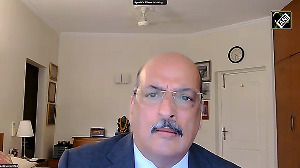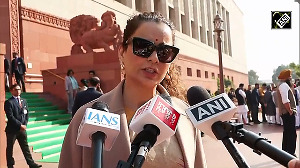Questioning the rationale of the Supreme Court's direction for a Central Bureau of Investigation inquiry into the 'disproportionate' assets of Uttar Pradesh Chief Minister Mulayam Singh Yadav and submission of the report to the Centre, his son Akhilesh Yadav told the apex court on Wednesday that its judgement was a serious assault on the country's federal structure.
Initiating the arguments on the review petition filed by Akhilesh, senior counsel Harish Yadav told the bench comprising Justices C K Thakker and Altamas Kabir that the apex court's March 1 order violated the federal spirit as envisaged by the Constitution.
"This court ordering a CBI inquiry into the issue and directing that the report be submitted to the Centre involves a serious federal issue," Salve told the bench during the arguments.
Akhilesh's argument was that on the basis of the direction, the Centre will use the CBI to target Mulayam Singh and his family members. However, Justice Kabir who was part of the earlier bench, which had ordered the probe, interjected to say that the court may consider the point in the hearing, but rejected the Samajawadi Party leader's other claim that courts have no power to order a CBI inquiry.
On March 1, the apex court had ordered the CBI to conduct a preliminary inquiry into the allegations that the chief minister and his family members had amassed disproportionate assets.
The court while ordering the CBI inquiry asked the agency to submit the report to the Centre to enable the latter take appropriate measures for a full fledged inquiry.
Salve also questioned the authority of the Apex court and high courts to order probes by the CBI into various issues.
Quoting Section 6 of the Delhi Special Police Act under which the CBI is constituted, Salve argued that the agency cannot take up investigations without the prior consent of the state government.
He submitted that Section 6 precluded the apex court and high courts from ordering a probe without the consent of the state government concerned.
However, Justice Kabir asked Salve to check his facts since the Act was subsequently amended with the introduction of Section 6A; to which the counsel agreed to do so and report back to the court.
When Salve repeatedly argued that the judiciary does not have power to order a CBI probe, the bench said the apex court and the high courts under Articles 142 and 226 respectively, enjoy inherent and extraordinary jurisdictional powers to decide on such matters.
According to Article 142, the Supreme Court can grant appropriate relief in cases where there is some manifest illegality, or where there is manifest want of jurisdiction, or where some palpable injustice is shown to have resulted.
The bench then referred to a three-judge apex court order in the case of one Shyam Lal wherein it was held that the Supreme Court and High Courts have the power to order a CBI inquiry.





